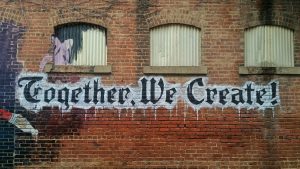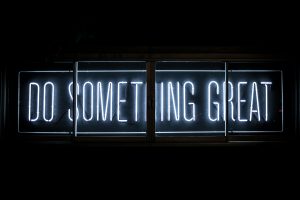In each of us, is a story, an experience, a message we want to share with the world. Regardless of whether or not we share that story while formally running for office or not, we want to make a difference. In order to do that, we need to make sure that how we say it is in a way others can hear it.
In the political arena, it is particularly challenging because the way the campaign trail is set up is counter to demonstrating two important points: Listening and Serving. Yet this is why we have politicians. They are here to listen to our needs so they can speak for us and make decisions on our behalves. However, the trail is focused on raising money and sharing one’s message. And I would argue, these activities run counter to the ultimate message.
So if we wanted to change the outcome, how might we do that? What would we alter?
Step 1: Recruiting tactics: Who do we train? As I thought about it, I was reminded of a question I was recently asked, “Do we train the welder to scuba dive or the scuba diver to weld?” Answer: We teach the welder to dive because ultimately, we need effective welding in a complex, difficult atmosphere. Translated to politics, “Do we train politicians to be knowledgeable about a variety of issues or do we train content experts the rules of politics?” Currently, we do the former, but I’d argue we need to do the latter because ultimately, it is most important to make effective improvements to our nation’s biggest issues.
Find brilliant cheerleaders – people who can balance the need to deliver clear messages with the ability to deep dive into extensive singular and meta-issues.

Step 2: Messaging: the ability to clearly, efficiently, and effectively share messages with our people. As a psychologist, I see messaging differently than has historically been the practice. I see it as a way to collaborate and invite involvement from constituents rather than an opportunity to convince others to support.
Remember, people don’t like you because you are amazing, they like you because they feel amazing around you.
So here is my general five-step process:
- #ANALYZE: There is no PC in Self Analysis: Know your audience, know your opponent, know yourself….entirely. This is not the time to sugarcoat. Constituents are #1 and that includes the ones that disagree with you. Recognize too that your opponent has strengths and that you have weaknesses. Of course the opposite is also true too but in order to best understand constituents’ needs and opponents’ actions, we have to analyze, honestly.
- #PREDICT: You don’t have to outrun the bear, you only have to out think him! I had a student who in a moment of frustration said, “JJ, it’s not like I can read your mind.” After a bit of questioning, he realized that in fact, he could. Being able to predict your opponent’s actions and reactions will help you play better political chess. Remember, thinking three steps ahead and planning your moves before you need them is powerful.
- #TRAIN: This is the Intellectual Olympics – Your mind is your greatest asset and requires a training regimen as intense and intentional as training for the Olympics. That means practicing your messaging, your ability to debate, your ability to listen, every day, with purpose, goals, and coaching. No one makes it to the Olympics on talent alone. Being able to control your emotions and focus your mind takes deliberate practice.
- #SERVE: Focus on others – Our goal is to serve our country but on the campaign trail, we spend most of our time asking for support. It can have the unintended effect of suggesting we care about ourselves more than others. We need to find a way to listen, collaborate, and demonstrate our true focus to serve our nation.
- #PROMOTE: Speak quietly and carry a big stick (–Roosevelt) – Few people are as interested in politics and solving problems as you are. Resist the urge to defend your position by providing every minute detail about why you are right….because, of course, when we defend our positions, we imply others are wrong. Listen, learn, and always remember that others frequently have ideas you haven’t yet considered. Promote them!
Most of all, love our people, display your brilliance, and promote the American Way…
And together we can inspire our Nation to greatness!




 There just aren’t enough threatening tigers to chase anymore and our people are left without enough outlets for their aggressions. I frequently tell a metaphorical story about a high speed training moving at a breakneck speed that is running toward a predictable outcome. You cannot simply stand in front of it and put up your hand and yell, “STOP!” It will, quite predictably, run you over. But this is most frequently how we handle so many issues – we try, oftentimes desperately, passionately, to explain to people why they must stop something – could be drugs, sex, relationships, or even war. But all of these things have a biological drive attached to them and because of that, humans will not stop just because you tell them to.
There just aren’t enough threatening tigers to chase anymore and our people are left without enough outlets for their aggressions. I frequently tell a metaphorical story about a high speed training moving at a breakneck speed that is running toward a predictable outcome. You cannot simply stand in front of it and put up your hand and yell, “STOP!” It will, quite predictably, run you over. But this is most frequently how we handle so many issues – we try, oftentimes desperately, passionately, to explain to people why they must stop something – could be drugs, sex, relationships, or even war. But all of these things have a biological drive attached to them and because of that, humans will not stop just because you tell them to.

 The athletes have worked incredibly hard and sacrificed so much to have the opportunity to compete at the Olympics. But at the same time, the specialness of this event is t
The athletes have worked incredibly hard and sacrificed so much to have the opportunity to compete at the Olympics. But at the same time, the specialness of this event is t
 T
T




 Perhaps then what we need is not to analyze who is right or which memo we shoul
Perhaps then what we need is not to analyze who is right or which memo we shoul Som
Som
